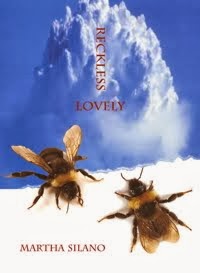 L to R: Oliver de la Paz, Ken Letko, Martha Silano, Christopher Howell
L to R: Oliver de la Paz, Ken Letko, Martha Silano, Christopher HowellI woke up Sunday morning feeling a little sad. The little clock by the bed said 7 am, and I knew it was my last day with a view of the Cathedral of Our Lady of Lourdes.
Also, no more Olympic-sized pool three floors down and to your left.
And the last poetry reading only four hours away. I was a bit wiped out and missing the fam, but wishing I didn't have to leave my room with the flip-flop paintings, my room with the cherub lamp. Not to mention the Spokane I'd come to know, with its Spokane River Falls slicing the city in two, with its universities and colleges with names like Gonzaga, along with the venerable Auntie's Bookstore in the heart of downtown. A little wistful, yes, and then I descended the staircase and made my way into the Civic Room for the final reading of the Festival.
Kathy Fagan, most recently the author of Lip, is a firecracker and then some. Editor, teacher, poet, and the Queen of Pantoums ("what attracted me to pantoums was the word pantoum, and what rhymes with pantoum . . . lagoon, swoon, moon, saloon . . ."), she treated us with her smart, musical, and image-rich poems. In "Road Memorial" she describes one of those hokey roadside crucifixes, where "X marks the spot where Jesus called our Jim-/bo home." I've always been drawn to these make-shift memorials along back highways in rural towns, "simple-/ton angels posed in imbecile poses." But it's one thing to be able to describe them. Fagan takes the examination of the kitsch to a whole 'nother level, stating "The highway is a public place and we, / a people dying for a sign," and ending with the killer:
This crap from Wal-mart could outlast us all,
which in our grief is no small com-
fort, since death lasts so much longer, and has no form.
Referring to herself as "a free verse poet obsessed with form," Fagan had me in her grip, for sure.
And then there was Simon of North Yorkshire, England. Not only a poet, but he also writes for TV, radio, film, translates the Greeks, and is in a band. He said he was a big believer in first impressions, so he was fascinated by a sign he saw when he first arrived in Spokane. It read
TOOLS, GUNS, AND JEWELRY
He is funny, is way into refrains, writes some of the best persona poems ("I am a Whale"), and he used the word canoodling in a poem. Canoodling! But best of all he speaks like a British person and loves the Clash.
Then I had to pack up and leave. I hate that part, except in this case I knew I'd be driving back across the state of Washington, past the exit for Ritzville and the Tokio Weigh Station, plus I had my little satchel of goodies from Huckleberry's, which I planned to eat while sitting next to a cluster of Balsamroot looking over the Columbia, and did.
Glory be to desert places! Glory be to getting lit by lit in Spokane!





